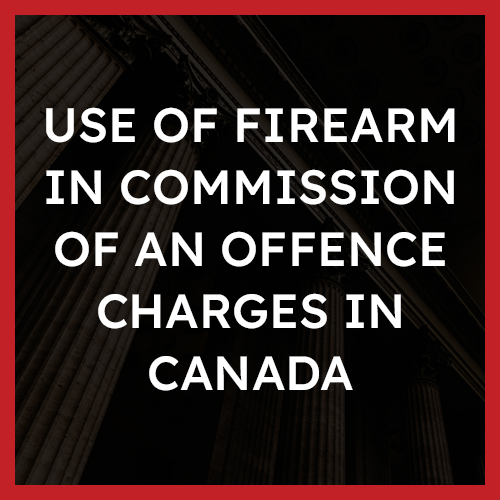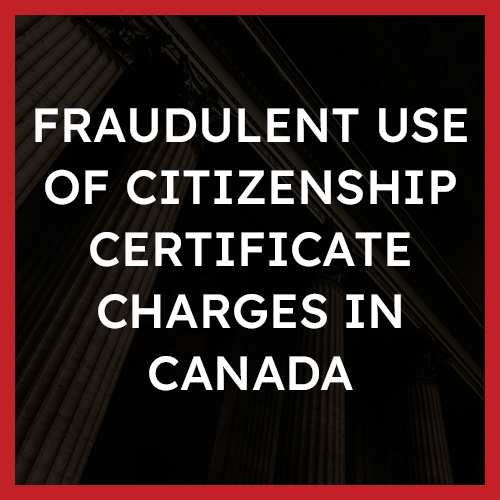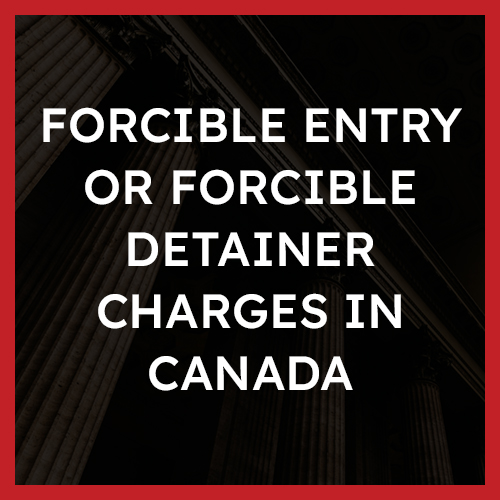Use of Firearm in Commission of an Offence (s. 85) Charges in Canada: Offences, Defences, Punishments
What is an Use of Firearm in Commission of an Offence charge?
 The offence of use of firearm in commission of an offence are found under s.85 of the Criminal Code.
The offence of use of firearm in commission of an offence are found under s.85 of the Criminal Code.
Offences relating to use of a firearm in commission of an offence are found in Part III of the Criminal Code relating to “Firearms and Other Weapons”.
Offences under s.85 of the Criminal Code are straight indictable offences, which means that the Crown cannot proceed otherwise.
Examples
Some examples of use of firearm in commission of an offence may include the following:
- Breaking into a home and holding a gun
- Using a gun while committing a theft
Defences
- Identity
- Essential elements of the offence are not met;
- Any applicable Charter defences.
Punishments
Every person who commits an offence under s.85(1) or s.85(2) of the Criminal Code is guilty of an indictable offence and liable to imprisonment for a term of not more than 14 years. The minimum penalty is one year in jail with no prior convictions under s. 85. In situations where no aggravating factors are present the minimum penalty is three years in jail with one or more priors
Overview of the Offence
Under s.85 of the Criminal Code.
(1) Every person commits an offence who uses a firearm, whether or not the person causes or means to cause bodily harm to any person as a result of using the firearm,
(a) while committing an indictable offence, other than an offence under section 220 (criminal negligence causing death), 236 (manslaughter), 239 (attempted murder), 244 (discharging firearm with intent), 244.2 (discharging firearm — recklessness), 272 (sexual assault with a weapon) or 273 (aggravated sexual assault), subsection 279(1) (kidnapping) or section 279.1 (hostage taking), 344 (robbery) or 346 (extortion);
(b) while attempting to commit an indictable offence; or
(c) during flight after committing or attempting to commit an indictable offence.
Using imitation firearm in commission of offence
(2) Every person commits an offence who uses an imitation firearm
(a) while committing an indictable offence,
(b) while attempting to commit an indictable offence, or
(c) during flight after committing or attempting to commit an indictable offence,
whether or not the person causes or means to cause bodily harm to any person as a result of using the imitation firearm.
This section prohibits and punishes use of a firearm, or an imitation firearm, during the actual or attempted commissioned of an indictable offence or flight from it.
The Guilty Act (Actus Reus)
The actus reus that the Crown must prove, beyond a reasonable doubt, for the purposes of s.85(1)
- You committed or attempted to commit an indictable offence, other than a listed offence; and
- You used a firearm while doing so or during flight afterwards.
Listed offences include the following:
- Criminal negligence causing death;
- Manslaughter;
- Attempted murder;
- Discharging firearm with intent;
- Discharging firearm – recklessness;
- Sexual assault with a weapon;
- Aggravated sexual assault;
- Kidnapping;
- Hostage taking;
- Robbery; or
For the purposes of s.85(2) the actus reus are parallel to those of s.85(1) except that s.85(2) involves the use of an imitation firearm and is engaged upon the actual or intended commission of any indictable offence or flight thereafter.
The Guilty Mind (Mens Rea)
The mens that the Crown must prove, beyond a reasonable doubt, is:
- Proof of the mental element of the indictable offence attempted or actually committed; and
- Intention to contemptuously use the firearm.
It is important to notes that there is no need to prove that you actually intended or caused bodily harm to any person as a result of the commission of the offence.
Additionally, the clause “use of a firearm” includes discharging or pointing a firearm or displaying a firearm for the purpose of intimidation while committing an offence.
However, the test in s.85(1) is not satisfied by:
- Mere possession of a firearm;
- Idle threat that refer to a firearm; or
- The proximity of a firearm for future use.
This means that s.85 of the Criminal Code has to do with situations where the firearm is at the ready for present rather than future use.
Defences
A strong defence depends entirely on the individual circumstances of your case. However, the following defences may be applicable:
Identity
The Crown needs to prove identity beyond a reasonable doubt. This means that the Crown must prove that it was you who committed the offence. This can often be difficult if there are no witnesses, if there were conditions present that prevented a witness from identifying you, or the offence was captured by poor quality surveillance footage. Sometimes mistakes do happen, the authorities could have made a mistake in identifying you as the perpetrator based on the poor quality of the footage. Your defence lawyer may be able to argue that the Crown cannot definitively prove that it was you who committed the offence, resulting in an acquittal.
Essential Elements of The Offence Are Not Met
In order for the Crown to convict you of an offence, the actus reus and the mens reas of the offence need to be proven beyond a reasonable doubt. If the Crown is unable to do so, the essential elements of the offence are not satisfied, and you cannot be convicted of the offence.
Applicable Charter defences
The Charter sets out you rights before and after arrest. In the event the police fail to abide by these rights, you may have an applicable Charter defence to your charge:
Common Charter breaches include:
- Section 8- Right to be secure from search and seizure;
- Section 9- Right not to be arbitrarily detained;
- Section 10- Right to be informed of reasons for detention or arrest:
- Section 11- General: legal rights apply to those “charged with an offence”
- Section 12- Cruel and unusual treatment or punishment
If any of your charter rights have been violated, you may be in a position to have any evidence obtained during the breach excluded.
Punishments
Every person who commits an offence under s.85(1) or s.85(2) of the Criminal Code is guilty of an indictable offence and liable to imprisonment for a term of not more than 14 years.
The minimum penalty is one year in jail with no prior convictions under s. 85. In cases where no aggravating factors are present the minimum penalty is three years incarceration with one or more priors.
Offences under s. 85 have mandatory minimums. There are no discharges, suspended sentences, stand-alone fines, or conditional sentences available.
Additionally, under s. 85(4), all sentences under s. 85(1) or 85(2) must be served consecutively to any other penalty imposed.
Frequently Asked Questions
Can you go to jail for Use of Firearm in Commission of an Offence?
Yes, every person who commits an offence under s.85(1) or s.85(2) of the Criminal Code is guilty of an indictable offence and liable to imprisonment for a term of not more than 14 years.
Is Use of Firearm in Commission of an Offence a serious offence?
Yes, use of a firearm in the commission of an offence is a serious offence. These offences are straight indictable offences and are prosecuted harshly.
Is Use of Firearm in Commission of a summary or indictable Offence?
Offences under s.85 of the Criminal Code are straight indictable offences.
Published Decisions
R v. Steele, 2007 SCC 36
The accused and three accomplices forcibly entered a home at night looking for a marijuana grow operation. The residents heard the intruders say, “We have a gun”, “Get the gun, get the gun”, and “Get the gun out.” And the residents saw an intruder pull a dark metal object from his inside jacket. The residents made two 911 calls describing the intruders and their getaway car. The police located the accused’s and searched the car and found several weapons, including a loaded handgun. The accused was charged with several offences, including using a firearm while committing or the accused was found guilty of the s. 85(1) offence and the Court of Appeal upheld the conviction.
You can read the full decision here.
R v. Andrade, 2015 ONCA 499
The appellant was convicted of possession of an imitation weapon for a purpose dangerous to the public peace, contrary to s. 88(1) of the Criminal Code, and use of an imitation firearm while committing an indictable offence, contrary to s. 85(2)(a) of the Code. On appeal, the issue was whether a conviction for possession of a weapon for a purpose dangerous to the public peace, commonly referred to as “weapons dangerous”, can constitute the predicate indictable offence necessary for a conviction under s. 85(2). Ultimately, the trial judge concluded that it could not and that the appellant’s conviction under s. 85(2) was set aside.
You can read the full decision here.
R v. Dodman, 2021 ONCA 543
This was an appeal by accused from the sentence imposed following his guilty pleas to robbery and use of an imitation firearm in the commission of an offence. The appellant, while masked, pointed a semi-automatic type of weapon at a convenience store clerk, repeatedly jabbed him with it and demanded money.
You can read the full decision here.
About The Author
Ask A Question
We endeavor to respond to questions within 24 hours. If your matter is urgent, please call our office or submit a request for a free consultation.







